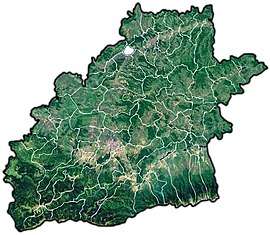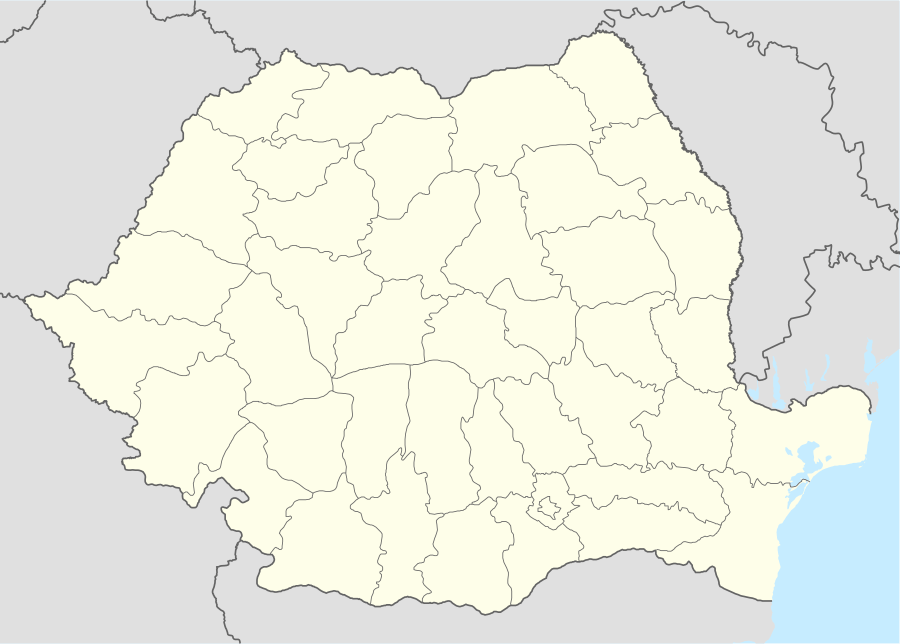Copșa Mică
Copșa Mică (German: Kleinkopisch; Hungarian: Kiskapus) is a town in Sibiu County, Transylvania, Romania, located north of Sibiu, 33 km east of Blaj, and 12 km southwest of Mediaș. The town's population of 5201 (as of 2011) is down significantly from its level in 1989, the year communism collapsed in Romania. At the 2011 census, 78.8% of inhabitants were Romanians, 11.9% Roma and 8.7% Hungarians.
Copșa Mică | |
|---|---|
Lutheran church | |
 Coat of arms | |
 Location in Sibiu County | |
 Copșa Mică Location in Romania | |
| Coordinates: 46°6′45″N 24°13′50″E | |
| Country | |
| County | Sibiu |
| Government | |
| • Mayor | Daniel-Tudor Mihalache[1] (PNL) |
| Area | 25.90 km2 (10.00 sq mi) |
| Population (2011)[2] | 5,404 |
| • Density | 210/km2 (540/sq mi) |
| Time zone | EET/EEST (UTC+2/+3) |
| Vehicle reg. | SB |
| Website | www |
| Year | Pop. | ±% |
|---|---|---|
| 1966 | 6,156 | — |
| 1977 | 6,194 | +0.6% |
| 1992 | 5,332 | −13.9% |
| 2002 | 5,157 | −3.3% |
| 2011 | 5,201 | +0.9% |
| Source: Census data | ||
The town is best known for its status (in the 1990s) as one of the most polluted in Europe. This was due to the emissions of two factories in the area:
- One, open from 1935 to 1993, produced carbon black for dyes; its emissions permeated the area for nearly sixty years, leaving soot on homes, trees, animals, and everything else in the area. The stain from these decades of deposits are still visible.
- The other source of the pollution, less visible but with even more serious effects to the health of the town's residents, was Sometra, a smelter whose emissions have contributed to significantly higher incidence of lung disease and impotence, along with a life expectancy nine years below Romania's average.
Politics
The Copșa Mică City Council (Consiliul Local Copșa Mică), elected in the 2008 local government elections, is made up of 15 councillors, with the following party composition:[3]
| Party | Seats | Current Council | ||||||||||
|---|---|---|---|---|---|---|---|---|---|---|---|---|
| National Liberal Party | 10 | |||||||||||
| Democratic Liberal Party | 2 | |||||||||||
| Social Democratic Party | 2 | |||||||||||
| Democratic Union of Hungarians in Romania | 1 | |||||||||||
gollark: Yes.
gollark: Very!
gollark: Not really!
gollark: See, multiline strings are nice.
gollark: Like how you're forced to use for loops because you can't write or have `map`.
References
- "Results of the 2016 local elections". Central Electoral Bureau. Retrieved 5 April 2020.
- "Populaţia stabilă pe judeţe, municipii, oraşe şi localităti componenete la RPL_2011" (in Romanian). National Institute of Statistics. Retrieved 4 February 2014.
- "Componenta". Copsa-mica.ro. Retrieved 8 October 2017.
External links
| Wikimedia Commons has media related to Copșa Mică. |
- Town's official website (in Romanian)
- 1993 project funded by UNIDO to assist in the establishment of cleaner production practices at Sometra
- Satellite photos of Copşa Mică in 1986 and 2004
- fragilecologies.com: The People and Pollution of Copsa Mica, Romania
- Copsa Mica's Past and Future: Can Europe's Most Polluted Town Go Green?
This article is issued from Wikipedia. The text is licensed under Creative Commons - Attribution - Sharealike. Additional terms may apply for the media files.
